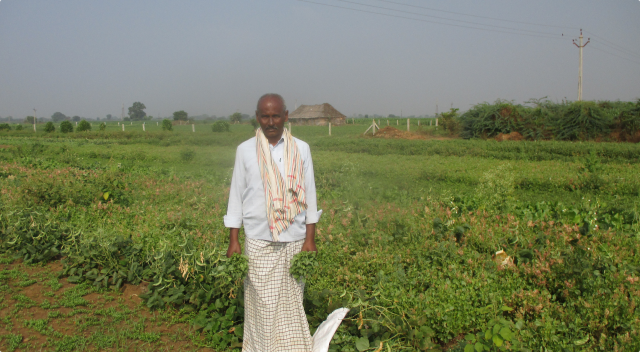Natural Resource Management
Organic Farming in Swayambu Varam
Judicious and efficient use and management of natural resources is a key element in sustainable development worldwide. We partner with the National Bank for Agriculture and Rural Development (NABARD) to enable farmers to conserve and manage natural resources such as soil and water and to adopt agricultural practices that are both sustainable and profitable.
The new methods we have introduced to farmers include organic farming and intercropping which have resulted in a shift away from conventional practices such as chemical pesticide and fertilizer use. As a result, not only have farmers contributed to bettering land health and greening the environment, but they have also gained from healthy yields, lower costs of inputs, and opportunities for improved livelihoods.
While there is growing awareness and demand for organic foods in India, farmers in the country continue to make extensive use of chemical methods, primarily to achieve higher yields and income. Against this backdrop, ReSL introduced organic agriculture in the village of Swayambu Varam was introduced. The initiative has been rolled out as a pilot project with 40 farmers on 30 acres of land. It provides know-how of new cultivation practices that at lower cost result in the same yields as conventional agriculture. The inputs include natural fertilizers and pesticides such as farmyard manure, green leaf manure, neem oil and cake, vermicompost, biofertilizer, Trichoderma cards, etc. In order to incentivize farmers to adopt these new methods, all inputs are funded by ReSL and provided free of charge.
The many impacts of this project are noteworthy. The cost of cultivation per acre has been reduced from INR 28, 000 to INR 18, 000. At the same time, crop yield has increased to 200 kgs per acre. Beyond the financial gain, participating farmers are satisfied with the results of organic farming methods and have voluntarily come forward to embrace these for the long run. Moreover, they are contributing to the health of the consumers of their produce. Importantly, their new practices contribute to improving soil health as pesticide residue has decreased and the growth of the plant and soil-friendly micro-organisms has increased.
Farmer Polavarapu Apparo has been cultivating paddy for the last 3 decades and has subscribed to the belief that increased use of chemicals generates higher crop yields. However, over the years, the cost of cultivation increased while the yield was not very satisfactory. When he was introduced to organic farming, he had many doubts. After different awareness creation and training sessions, he was convinced and cultivated paddy organically on 1 acre under the guidance of state government agriculture officials and the ReSL team. Although the field continued to be affected by pests and disease, these were of a lower intensity compared to chemical farming and the crop yield increased. This experience changed his perception of organic farming and motivated him to adopt natural cultivation practices to a larger extent.
- Zero Waste

